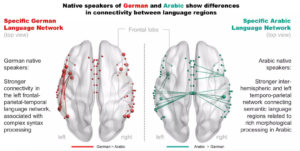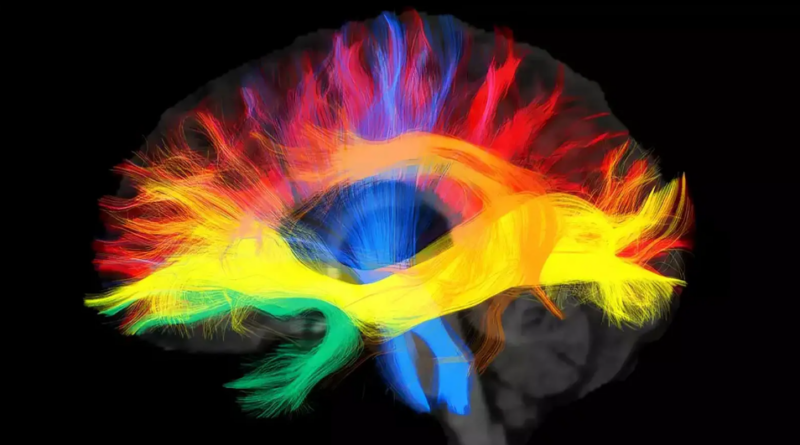Language Influences Brain Connections 2023
Scientists at the Max Planck Institute for Human Cognitive and Brain Sciences in Leipzig have discovered evidence that the language we use influences the connection in our brains, which may be the basis of our cognitive processes. They examined the brains of native German and Arabic speakers using magnetic resonance tomography and observed changes in the wiring of the language areas.

The language network adapts to mother tongue processing challenges.
Xuehu Wei, a doctorate student on the study team led by Alfred Anwander and Angela Friederici, analyzed the brain scans of 94 native speakers of two vastly different languages to demonstrate that the language we grow up speaking affects the brain’s wiring. A magnetic resonance imaging (MRI) scanner was used to scan two groups of native speakers of German and Arabic, respectively. Using a method called diffusion-weighted imaging, the high-resolution pictures not only reveal the morphology of the brain, but also allow us to determine the connections between brain regions. The research demonstrated that the axonal white matter connections of the language network adapt to the processing requirements and complexities of the mother tongue.
“Arabic native speakers demonstrated more connection between the left and right hemispheres than German native speakers,” noted Alfred Anwander, the study’s last author and the editor-in-chief of the journal NeuroImage. Similar strengthening was also observed between semantic language areas, which may be attributable to the unusually complicated semantic and phonological processing in Arabic.
The Language We Talk Influences Brain Connections
The researchers revealed that native German speakers had greater connection in the language network of the left brain. They contend that these findings may be connected to German’s sophisticated syntactic processing, which is a result of the language’s unrestricted word order and increased dependence distance between sentence pieces.
“Learning and the environment throughout childhood modify brain connection, which effects processing and cognitive reasoning in the adult brain.” Our work gives fresh insights into how the brain adjusts to cognitive demands, namely that the mother tongue shapes the structural language connectome, as Anwander describes. This is one of the first studies to reveal variations in the brains of people who grew up speaking various native languages, and it may provide researchers with a means to comprehend disparities in brain function across cultures.
In the next study, the research team will examine the longitudinal structural changes that occur in the brains of Arabic-speaking people learning German over a six-month period.



